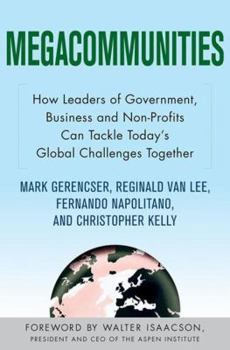Megacommunities: How Leaders of Government, Business and Non-Profits Can Tackle Today's Global Challenges Together
Select Format
Select Condition 
Book Overview
A hurricane strikes a city; terrorists attack a nation; global warming threatens the environment--such problems are too large for any one authority to solve alone. Our increasingly globalized and... This description may be from another edition of this product.
Format:Hardcover
Language:English
ISBN:023060398X
ISBN13:9780230603981
Release Date:March 2008
Publisher:Palgrave MacMillan
Length:255 Pages
Weight:0.45 lbs.
Dimensions:0.9" x 6.3" x 9.6"
Related Subjects
Accounting & Finance Business Business & Investing Communication Policy Economics Elections & Political Process Globalization Industries & Professions International Leadership Management Management & Leadership Non-Governmental Organizations Nonprofit Organizations & Charities Political Science Politics & Government Politics & Social Sciences Public Affairs & Administration Public Affairs & Policy Reference Strategy & CompetitionCustomer Reviews
3 ratings
A good start, but not enough
Published by Thriftbooks.com User , 15 years ago
I've never found a book on this topic before; I was turned on to it by a colleague of the authors since I'm working in an area that needs a "megacommunity" in order to truly address the enormous issues at hand. This book is a fantastic guide for how to recognize and think about multistakeholder issues, and how to begin to address them. Too often stakeholder groups, particularly industry and NGOs, just come right out fighting. If they really and truly understood each others' points and situations they may in fact find that they can align to have similar goals and achieve their ends more readily, at lower cost, and in a mutually satisfying manner. The book provides many examples. However, the book suffers from three problems: First, many of the examples are more "microcommunity" than "megacommunity"; for instance - a single company in a single location dealing with a single issue. The example of a power company building a plant in a small town in Italy, while demonstrating the negatives of not working together vs. working together with different stakeholders gives an inkling of the concept but it is not "mega" by any stretch. Second, the authors have apparently not yet had to deal with massive international multistakeholder issues like global warming or chemical regulation. Examples in those areas are needed, but are not yet available so it's no fault of the authors, it's the fault of the stakeholders. We have yet to construct our "megacommunity" and start working to get things done. Third, the definition of stakeholders in a "megacommunity" is perhaps too narrow; only three are defined: industry, NGOs, and government. There is at least one example in the book that includes academia, a fourth (and often very important) stakeholder group. Two more, necessary for chemicals and global warming, include labor and standards development organizations. So I want to see the next volume in the series!
Megacommunities
Published by Thriftbooks.com User , 16 years ago
This work seeks to formulate a new business model for articulating complicated problems which are interdisciplinary in nature with extensive reaches into multiple parts of the community at large. The authors describe non-linear activity flows and events; such as, Katrina. We are limited by complexity, cross-boundaries, communications, differences between "the haves" and "the have nots" and imbalances in the transactional flows of major systems. The megacommunity is the merging of the public sphere, business and civil society. These are the strategic constituencies with the levers of influence, shared interests and major areas of convergence. Barnstorming solutions, pattern study, permanent negotiation, constant reconciliation and mapping shareholders are the norm in order to define, structure and solve problems of a higher order or intractable nature. The book is an excellent work for assisting communities in the hard work of problem definition, structure and resolution. The authors transcend existing methodologies to seek solutions in a global-collaborative way. This work would be helpful in formulating solutions to classic problems that have beset this country and this world.
Optimize versus Maximize - - - The Interdependence Imperative
Published by Thriftbooks.com User , 16 years ago
The authors make a convincing case for how the prevailing paradigm in business, government, and the non-profit sector of "Winner Take All Competition" is being exposed as a dead end. The "MAXIMIZE returns for OUR constituents paradigm" just doesn't work when the job is to address large complex and interconnected challenges like - Sustainable Energy - Global Terrorism - Fair Trade Coffee. When faced with such a challenge, the "OPTIMIZE returns for ALL stakeholders" is the most effective strategy. The trick is that, executing this strategy requires a very different set of skills and mindsets. The great thing about this book is that it doesn't just prescribe a solution, it provides a blueprint for initiating, structuring, sustaining, and leading these Megacommunities.





